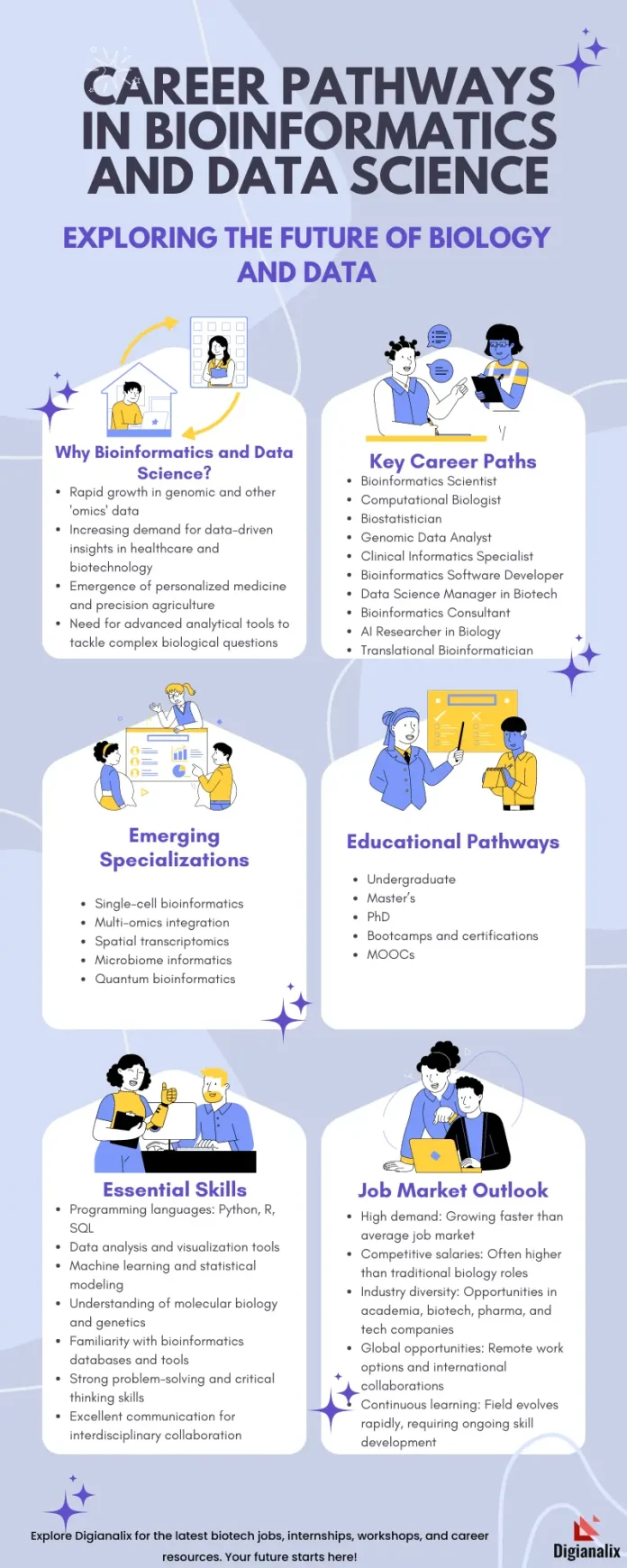“Exploring the Future of Biology and Data”
Hey there, data-loving biology enthusiasts! 👋 Ready to explore the exciting career opportunities at the intersection of biology and data science? Let’s dive into the world of bioinformatics and data science careers that are shaping the future of biotechnology!
🧬💻 Why bioinformatics and data science?
The explosion of biological data and the need to make sense of it all has created a booming job market for professionals who can bridge the gap between biology and computational analysis. Here’s why these fields are so hot right now:
- Rapid growth in genomic and other ‘omics’ data
- Increasing demand for data-driven insights in healthcare and biotechnology
- Emergence of personalized medicine and precision agriculture
- Need for advanced analytical tools to tackle complex biological questions
Let’s explore the diverse career pathways available in this exciting field!
🚀 Key career paths in bioinformatics and data science
- Bioinformatics Scientist
- Role: Develop algorithms and tools for biological data analysis
- Skills: Programming, statistical analysis, molecular biology knowledge
- Industries: Research institutions, biotech companies, pharmaceuticals
- Computational Biologist
- Role: Model biological systems and analyze complex datasets
- Skills: Machine learning, systems biology, programming
- Applications: Drug discovery, genomics, protein structure prediction
- Biostatistician
- Role: Design and analyze biological experiments and clinical trials
- Skills: Advanced statistics, experimental design, data visualization
- Sectors: Healthcare, pharmaceutical companies, government agencies
- Genomic Data Analyst
- Role: Analyze and interpret genomic sequencing data
- Skills: NGS technologies, variant calling, pathway analysis
- Focus areas: Cancer genomics, population genetics, agricultural genomics
- Clinical Informatics Specialist
- Role: Manage and analyze clinical data for improved patient care
- Skills: Electronic health records, data integration, healthcare IT
- Settings: Hospitals, healthcare systems, health tech companies
- Bioinformatics Software Developer
- Role: Create software tools and databases for biological data analysis
- Skills: Software engineering, database management, UI/UX design
- Products: Sequence alignment tools, pathway analysis software, genomic databases
- Data Science Manager in Biotech
- Role: Lead data science teams and projects in biotechnology
- Skills: Leadership, project management, cross-functional communication
- Responsibilities: Strategy development, resource allocation, stakeholder management
- Bioinformatics Consultant
- Role: Provide expert advice on bioinformatics strategies and tools
- Skills: Broad knowledge of bioinformatics, excellent communication
- Clients: Biotech startups, research labs, pharmaceutical companies
- Artificial Intelligence Researcher in Biology
- Role: Develop AI and machine learning models for biological applications
- Skills: Deep learning, natural language processing, biological domain knowledge
- Applications: Protein folding prediction, drug-target interaction, image analysis
- Translational Bioinformatician
- Role: Bridge the gap between computational analysis and clinical applications
- Skills: Clinical data analysis, biomarker discovery, precision medicine
- Impact: Bringing computational insights to bedside care
💡 Emerging specializations
- Single-cell bioinformatics: Analyzing data from individual cells
- Multi-omics integration: Combining data from various ‘omics’ technologies
- Spatial transcriptomics: Analyzing gene expression with spatial context
- Microbiome informatics: Studying complex microbial communities
- Quantum bioinformatics: Leveraging quantum computing for biological problems
🎓 Educational pathways
- Undergraduate: Degrees in bioinformatics, computational biology, or data science with a biology focus
- Master’s: Specialized programs in bioinformatics or biological data science
- PhD: Advanced research in specific areas of computational biology or bioinformatics
- Bootcamps and certifications: For quick skill acquisition or career transitions
- MOOCs: Online courses for continuous learning and skill updates
🔧 Essential skills for success
- Programming languages: Python, R, SQL
- Data analysis and visualization tools
- Machine learning and statistical modeling
- Understanding of molecular biology and genetics
- Familiarity with bioinformatics databases and tools
- Strong problem-solving and critical thinking skills
- Excellent communication for interdisciplinary collaboration
💼 Job market outlook
The job market for bioinformatics and biological data science is booming! Here’s what you can expect:
- High demand: Growing faster than average job market
- Competitive salaries: Often higher than traditional biology roles
- Industry diversity: Opportunities in academia, biotech, pharma, and tech companies
- Global opportunities: Remote work options and international collaborations
- Continuous learning: Field evolves rapidly, requiring ongoing skill development
🌟 Tips for career success
- Build a strong project portfolio showcasing your skills
- Contribute to open-source bioinformatics projects
- Attend conferences and workshops to stay updated and network
- Seek internships or collaborative projects for hands-on experience
- Develop your communication skills to bridge biology and data science
- Stay curious and keep learning as the field evolves
🤔 Finding your niche
With so many options, how do you choose? Consider:
- Your favorite aspects of biology (e.g., genomics, proteomics, ecology)
- Your preferred type of work (e.g., tool development, data analysis, theoretical modeling)
- The impact you want to make (e.g., drug discovery, personalized medicine, environmental conservation)
🌍 The bigger picture
Careers in bioinformatics and data science offer more than just job security – they provide opportunities to contribute to groundbreaking discoveries and innovations that can improve human health, protect our environment, and advance our understanding of life itself.
What aspect of bioinformatics or biological data science excites you the most? Are you considering a career in this field? Share your thoughts and questions in the comments below!
Stay connected with the latest trends and opportunities in bioinformatics and data science by subscribing to our site. Let’s navigate this exciting career landscape together!




